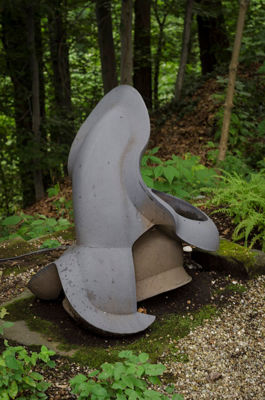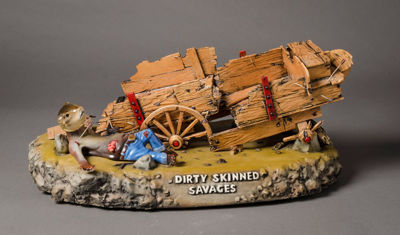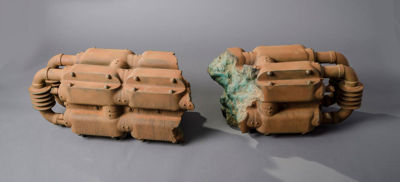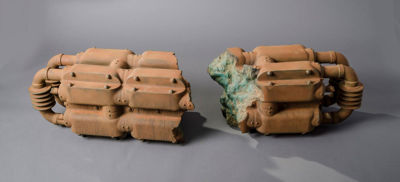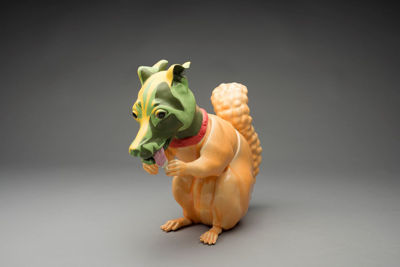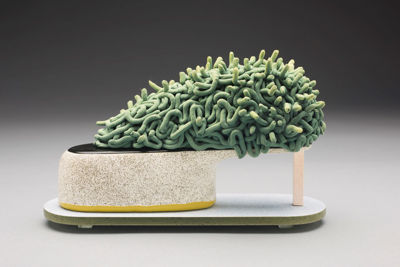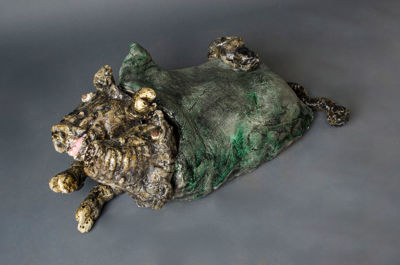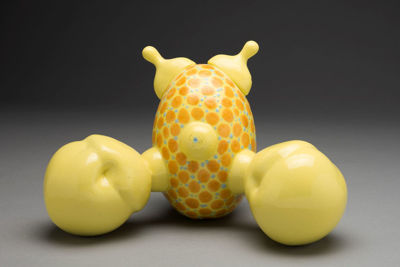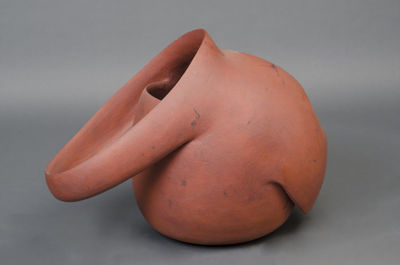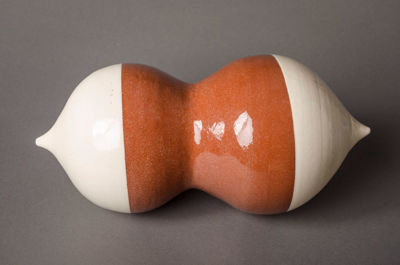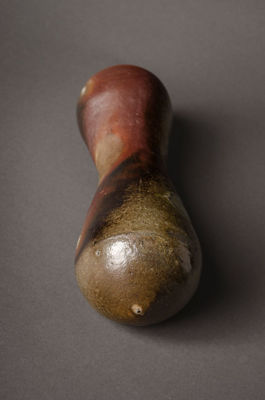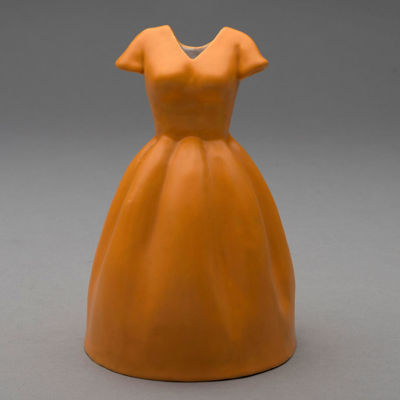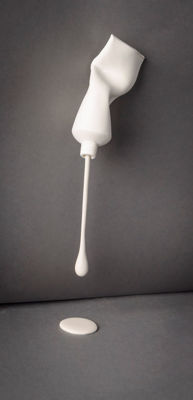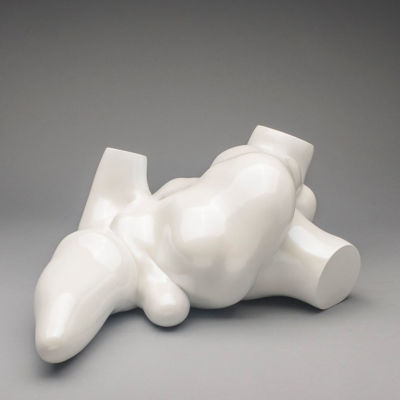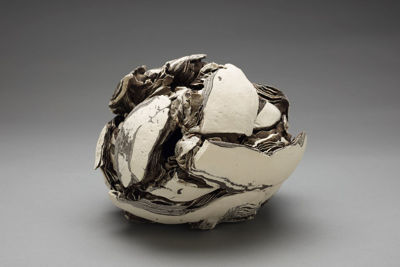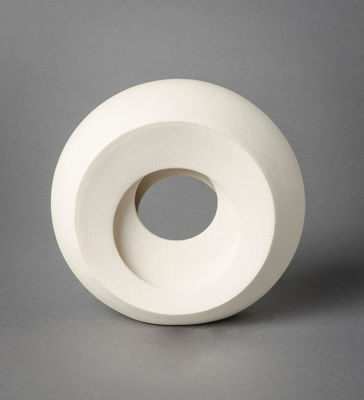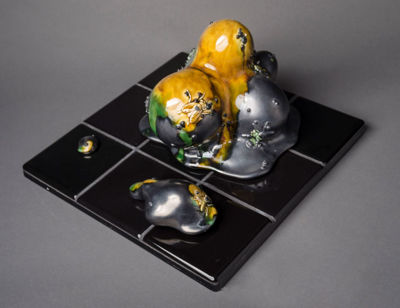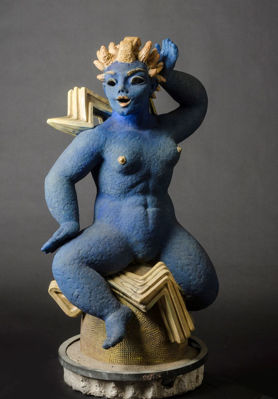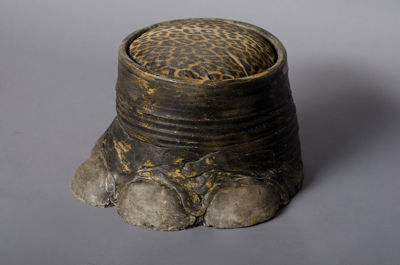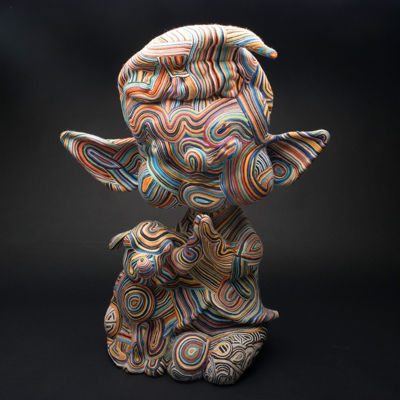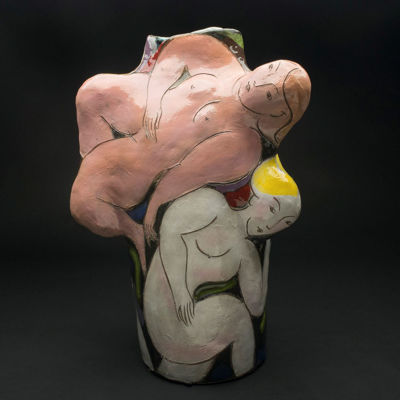Ceramics
Title: Disfigurine
Ceramic’s residual historical value is set on a very traditional, conservative and westernised model, and Novak’s sculpture is a vehicle to unpick and destabilise its austere solidity. ‘Disfigurine’ evokes classical female figurative representation with its use of a simple white porcelain and ornamental plinth, but depicts a darker act of self-harm as scissors are brandished to precisely incise a deep cut into the models wrist. Novak seeks to make a political statement on artistic beauty and order often meeting precisely at a point of deep unrest, and at greater overall cost to social responsibility.
Title: Disjunction No. 3
'Disjunction No. 3' typifies Montgomery’s interest in junk, detritus and ruin as monument, the outpourings of his practice a miasma of industrial, apocalyptic or apocryphal degradation in clay form. The complexity of technology evades and fascinates the artist, but he also finds it something to distrust — and the decision to adroitly shape its likeness in clay and then to shatter its integrity speaks of a desire to refigure its position within the human condition.
Title: Dog Teapot
Warashina sources a teapot in a surprising and mischievous form, translating the cartoon stance of the dog into a decorative vessel that predicates function from an unorthodox and remarkably captured animal movement. Through her 50-year career Warshima has frequently studded her work with subtle political and social critique, the influence of California Funk and surrealism shifting her craft to become a vehicle for mischievous figurative plots, and the begging gesture of ’Dog Teapot’ might conceal a greater skepticism.
Title: Don't Let the Little Head Rule the Big Head
Brownsword’s ceramics are strange, otherworldly obsessions, collaging a process with clay that celebrates a fragmented, morsel-like approach over single resolved works — a reaction to years working in the production line at the Wedgwood factory in Stoke. ‘Don’t Let The Little Head Rule the Big Head’ finds the artist at his most figurative, forming his chemical offcuts of clay into rawly expressive narrative. Works from this period had begun to slyly reference exterior relationships, and here Brownsword has acknowledged a colleagues’ juggling of married life and ongoing infidelities as the oblique subject.
Title: Double Vessel
Variously referred to as potter or sculptor, Keep creates metaphoric pots that seek a balance between an inherited aesthetic language of ceramic and the motion and direction of the human form, both in material and poetic justification. ‘Double Vessel’ explores a duality in a single vessel, the pot refigured as two with elegant use of shape to appropriately form a resolved silhouette at either angle, the elements having been thrown on the wheel in an unrefined clay then carefully arranged in an imperfect symmetry.
Title: Electron, Fountain of the Atom
WAYLANDE GREGORY (1905 - 1971); Female Electron with Lightning Bolt from the Fountain of the Atom, ca. 1938; Glazed earthenware; Unmarked; 46 1/2" x 30" x 20"; Located on the Bowling Green Plaza by the newly renovated subway entrance and in front of the Contemporary Arts Building, Waylande Gregory's "Fountain of the Atom" was hard to miss or forget. It was Gregory's most famous work at the 1939 New York World's Fair, and probably the most memorable work of his career. The Fountain was constructed of a steel frame and glass bricks. It consisted of a bluish green pool 65 feet in diameter. Above it were two concentric circular tiers, or 'terraces' as Gregory called them, the first wider than the second. On the first terrace were eight "Electrons" composed of four male and four female terra cotta figures, each about 48 inches high, These represented the valence electrons of the atom. Above them, on the narrower terrace were four "ton sized" " Elements," the female "Earth" (now in the collection of the Philadelphia Museum) and "Fire," and the male "Air" and "Water" (now in the collection of the Cranbrook Museum). Streams of water constantly tumbled down the glass blocks, and a colorful flame burned at the top.; Provenance: Private Collection, New York.; Estate of the artist.; Exhibited: New York World's Fair 1939-40; Anderson and Perry," The Diversions of Keramos, American Clay Sculpture 1925-1950," Everson Museum of Art, Syracuse, NY, September 9- November 27, 1983, and traveling to the New Jersey State Museum, Trenton, February 18- April 15, 1984; Illustrated: "World's Fair, Surprise! Surprise! Surprise! They Will Lurk at Every Turn. These Little Savages are Electrons." Life Magazine, no. 11 (March 13, 1939), p. 37; "The Octet Theory of the Atom in Terra Cotta: The Fountain of the Atom at the New York World's Fair," Illustrated London News, April 29, 1939, p. 719
Title: Elf with Puppy
Lucero is as renowned for his painterly abstractions and surrealism as his ceramics, and ‘Elf With Puppy’s striking appearance finds itself in the shock of colour applied in underglaze and sgraffito as a skin. Lucero’s common interest in colliding elements of pop & surrealist art lends an air of plasticky unreality to the piece, the childish appeal of the elf and its kitschy, “yarn-covered” Lambie-esque finish looks as though popped fresh out of a cartoon — the rounded, bulbous ceramic form impressive for resting such a large squat head on a slight body. His practice with clay has been cited as fine art reflected at a larger and more fluid scale, incorporating and evoking archaeology, home crafts and overlooked portions of folk art or popular culture.


